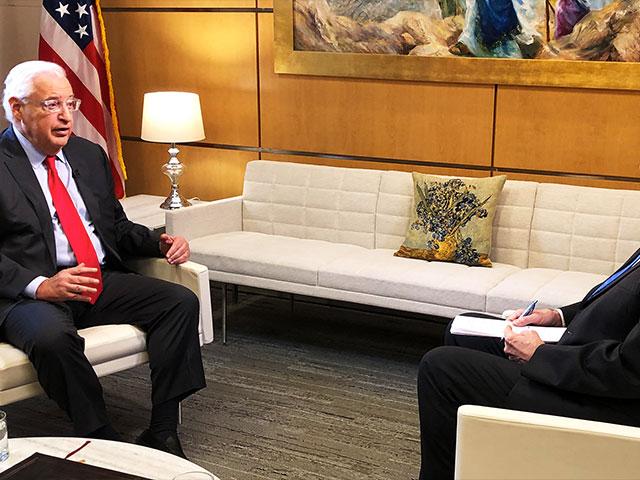
JERUSALEM, Israel – One of the key architects shaping US foreign policy in the Middle East for nearly four years has been US Ambassador David Friedman. Friedman told CBN News during his last official interview in the US embassy in Jerusalem that the work he accomplished over the past four years will help the incoming Biden administration get off to a good start.
“Normally, when you come to office the Middle East is all ablaze and it becomes a challenge. I think it’s not the place here. We’ve left the Middle East in a good place. I would urge real caution in changing any of the dynamics. It ain’t broke, don’t fix it,” he said.
That includes potentially renewing the Iranian nuclear deal. The Trump administration ended the 2015 agreement known as the Joint Comprehensive Plan of Action (JCPOA) that had been struck by the Obama administration.
Friedman warned the Biden Administration against rejoining the JCPOA, calling it “an enormous mistake.”
“It could threaten all the advances we’ve made in the region,” he continued. “There really is no rational basis to the JCOPA. You know, one of the arguments that kept coming up then in favor of the JCPOA was, you know, if we let Iran back into the community of nations, they will self-modulate. They will self-correct. Five years later, we know the truth, we know that they didn’t self-correct. The idea that we would give Iran a path to a bomb is frankly insanity.”
Friedman also believes such a move could threaten the Abraham Accords, an achievement that took many by surprise, but not Friedman.
“The seeds of this relationship have been there for years,” he explained. They were there under the Obama Administration as well. They were there. They needed some water. They needed some fertilizer. They needed some real engagement. But we knew from the beginning that they were onto something.”
Ambassador Friedman pointed out what he believes set the Trump administration apart.
“What I think I’m most proud of is that our administration really extended to Israel not just the courtesy but the right to really self-determination, to really decide for themselves how to govern, and I hope that courtesy continues to be extended because that’s where I think we really made a difference.”
That set the stage for historic moves such as the United States recognizing Israeli sovereignty over the Golan Heights, declaring Jerusalem as Israel’s capital and moving the US embassy there.
“I think the most significant event of the four years was moving the Embassy to Jerusalem. I just think so much, so much came from that. I think when we moved the Embassy, when we recognized Jerusalem, I think it just opened up possibilities, enormous possibilities for the Israel-US relationship and I think it really put America on the right track,” said Friedman.
The ambassador also helped change the US approach to Israel’s biblical heartland and the Israeli-Palestinian conflict.
“What we did was in the best interest of the United States, not just of Israel,” said Friedman, adding that such controversial moves led to peace instead of more violence.
“We were able to achieve once-in-a-generation agreements with Bahrain and the Emirates, Sudan, Morocco, Kosovo, all Muslim countries.”
As ambassador, one bible story inspired Friedman. He kept this painting of the story of the sin of the ten spies who went into the Promised Land
“The one sin I don’t want to commit is the sin of the spies, the sin of not having enough faith or confidence or vision in the relationship between Israel and the United States and the importance of keeping that as strong as possible.”
While the new administration hasn’t announced a replacement, many experts on both sides agree Ambassador Friedman will be a tough act to follow.
The remainder of this article is available in its entirety at CBN